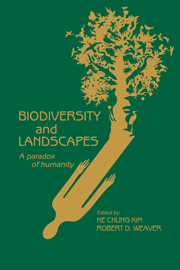Book contents
- Frontmatter
- Contents
- Contributors
- Preface
- Part I Introduction
- Part II Human values and biodiversity
- Part III Human processes and biodiversity
- Part IV Management of biodiversity and landscapes
- Part V Socioeconomics of biodiversity
- 13 Economic valuation of biodiversity
- 14 Thinking about the value of biodiversity
- 15 Lessons from the aging Amazon frontier: opportunities for genuine development
- Part VI Strategies for biodiversity conservation
- Part VII Biodiversity and landscapes: postscript
- Index
13 - Economic valuation of biodiversity
Published online by Cambridge University Press: 04 August 2010
- Frontmatter
- Contents
- Contributors
- Preface
- Part I Introduction
- Part II Human values and biodiversity
- Part III Human processes and biodiversity
- Part IV Management of biodiversity and landscapes
- Part V Socioeconomics of biodiversity
- 13 Economic valuation of biodiversity
- 14 Thinking about the value of biodiversity
- 15 Lessons from the aging Amazon frontier: opportunities for genuine development
- Part VI Strategies for biodiversity conservation
- Part VII Biodiversity and landscapes: postscript
- Index
Summary
Introduction
The economic valuation of goods and services is often viewed as a heartless, quantitative process that is inappropriate as an aid to many of the great decisions faced by individuals or society as a whole. Within the context of biodiversity, many argue that it is absurd to attempt to place an economic value on a species or ecosystem. Nonetheless, society is increasingly faced with decisions that will directly affect the survival of species and ecosystems. Such decisions are no longer abstract or hypothetical, but have boiled down to the meanest terms of spotted owls versus lumber and jobs, or snail darters versus water management and power generation projects. Faced with these imperatives for decisions, society is increasingly forced to recognize that biodiversity must be explicitly “provided,” that is, society must make explicit decisions to dedicate the use of economic goods and resources to ensure the existence of or influence the extent of biodiversity. In this sense, society is forced to recognize the cost of “provision” of biodiversity. Faced with such imperatives, a clear social interest in the economic value of biodiversity emerges naturally and understandably.
In this chapter the role of economic valuation of biodiversity will be considered. In the next section of this chapter the paradox of the value of public goods will be reviewed, establishing the universal problem of economic valuation of public goods. The following section will establish that characteristics of biodiversity may be viewed as public goods. Within this context, the final section of the chapter will more specifically consider the role of economic valuation for biodiversity.
- Type
- Chapter
- Information
- Biodiversity and LandscapesA Paradox of Humanity, pp. 255 - 270Publisher: Cambridge University PressPrint publication year: 1994
- 4
- Cited by



